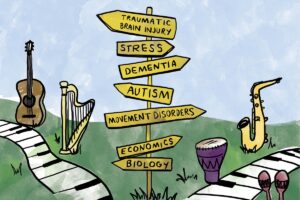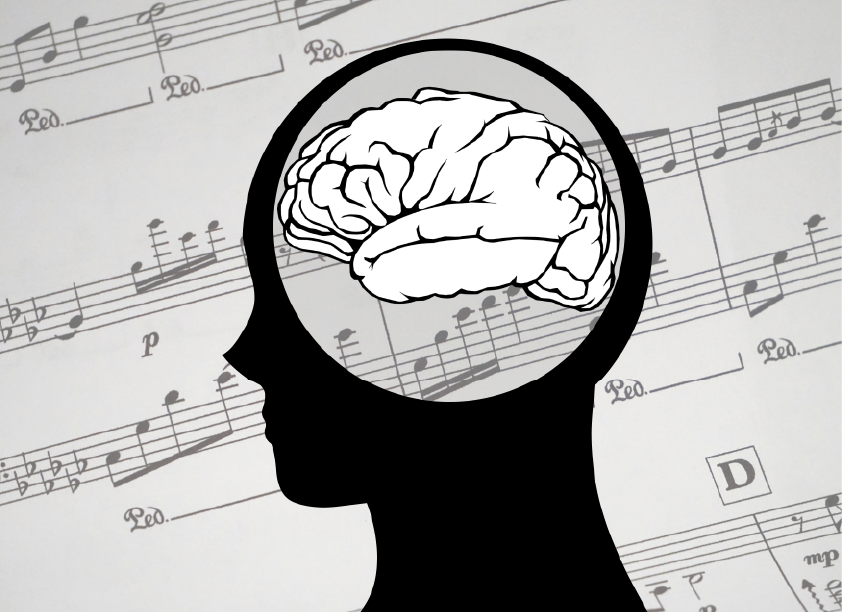Exploring the Impact of Music on Mental Health and Well-Being
music on mental health
Click for Quick Consultation at vituras
Understanding the Mind-Music Connection
When it comes to understanding the mind-music connection, there is a wealth of research that supports the idea that music has a profound impact on the human brain. The way in which our brains respond to music, whether it’s listening to a song or playing a musical instrument, is truly fascinating.
Studies have shown that certain types of music can have a direct influence on our mood and emotions. For example, listening to upbeat and fast-paced music can elicit feelings of happiness and excitement, while slower, more melodic tunes can induce a sense of calm and relaxation.
Furthermore, music has been found to stimulate various areas of the brain, including those responsible for memory, attention, and problem-solving. This suggests that there is a strong correlation between music and cognitive functioning, with the potential for music on mental health.
Overall, understanding the mind-music connection entails exploring the intricate ways in which music affects our thoughts, feelings, and overall music on mental health and well-being. By delving into the science behind music’s impact on the brain, we can gain a deeper appreciation for the power of music in shaping our psychological experiences.
The Positive Effects of Music on Mood
Music has the power to significantly impact our mood in various ways. Whether we are feeling happy, sad, stressed, or relaxed, music has the ability to enhance or alter our emotional state. Listening to upbeat and lively music can boost our mood and make us feel more energetic and positive. On the other hand, soothing and calming music can help to relax our mind and body, reducing feelings of anxiety and tension. The melodies and rhythms in music have a direct connection to our emotional responses, creating an immediate and lasting effect on our overall mood.
Research has shown that music can stimulate the release of dopamine, a neurotransmitter associated with pleasure and reward, in the brain. This release of dopamine can result in an improved mood and a heightened sense of happiness. Moreover, music has the ability to activate the brain’s reward system, leading to feelings of euphoria and emotional fulfillment. It’s no wonder that music is often used as a means of personal and emotional expression, providing individuals with an outlet for their feelings and a way to positively influence their mood.
In addition to its immediate effects on mood, music can also serve as a long-term source of emotional support and comfort. People often turn to music during difficult times as a way to cope with their emotions and find solace. Certain songs or melodies may hold personal significance, evoking memories and emotions that provide a sense of emotional connection and reassurance. Whether it’s a soothing ballad that brings a sense of calm or an uplifting anthem that instills feelings of empowerment, music has the remarkable ability to uplift and enrich our mood in both the short and long term.
Moreover, the act of actively engaging with music, such as playing an instrument or singing, can serve as a form of self-expression and creative outlet, leading to a sense of accomplishment and fulfillment. This active participation in music can have a profound impact on our mood, providing an avenue for personal and emotional expression. The creative process involved in making music can be therapeutic and empowering, allowing individuals to channel their emotions and express themselves in a way that positively influences their mood and overall well-being.
Utilizing Music as a Stress-Relief Tool
Utilizing music as a stress-relief tool can have profound effects on our mental health and emotional well-being. Music has the power to calm our minds and soothe our souls, making it an effective tool for managing stress and anxiety.
Listening to uplifting and relaxing music can trigger the release of dopamine, a neurotransmitter associated with pleasure and reward, which can help to alleviate feelings of stress and tension. This can have a direct impact on our mood and overall sense of well-being, providing a much-needed break from the pressures of everyday life.
In addition to listening to music, actively participating in music-making activities such as singing, playing an instrument, or dancing can also be a powerful stress-relief tool. Engaging in these activities can help to distract the mind from worrisome thoughts and promote a sense of relaxation and joy.
Whether it’s through passive listening or active participation, the use of music as a stress-relief tool is a simple yet effective way to promote mental and emotional wellness. By incorporating music into our daily routines, we can tap into its therapeutic potential and cultivate a greater sense of calm and balance in our lives.

Music Therapy: A Holistic Approach to Mental Health
Music therapy is a holistic approach and music on mental health that has been gaining recognition and popularity in recent years. The use of music as a therapeutic tool is based on the understanding that music has the power to affect our emotions, thoughts, and behaviors. Through the use of music therapy, individuals are able to explore and express their emotions, improve their cognitive functioning, and reduce stress and anxiety.
One of the key benefits of music therapy is its ability to address both the psychological and physiological aspects of music on mental health. It can help individuals to process and express difficult emotions, and can also have a calming effect on the body, reducing symptoms of anxiety and depression. By engaging with music in a therapeutic setting, individuals can experience a sense of empowerment and self-discovery, leading to improved overall well-being.
Another important aspect of music therapy is its ability to promote socialization and connection. Whether it’s through group music-making, singing, or listening to music together, individuals can experience a sense of community and belonging. This can be especially beneficial for those struggling with feelings of isolation or loneliness, and can contribute to a sense of purpose and meaning in life.
Overall, music therapy offers a holistic approach to mental health, addressing the emotional, physical, and social aspects of well-being. It is a powerful tool that can be used in conjunction with other forms of therapy, or as a stand-alone treatment for individuals of all ages. As the understanding of the mind-music connection continues to grow, so too does the potential for music therapy to contribute to positive mental health outcomes.
Exploring the Power of Lyrics for Emotional Expression
Lyrics have a profound impact on our emotions and music on mental health and well-being. The words of a song have the power to evoke a wide range of emotions, from joy and excitement to sadness and nostalgia. When we listen to lyrics that resonate with our own experiences, it can feel as though the songwriter has reached into our hearts and put our feelings into words.
Furthermore, lyrics provide a unique outlet for emotional expression. Many people turn to music during difficult times, finding solace in the words of their favorite songs. Whether it’s a breakup, loss, or other challenging life events, the lyrics of a song can provide a sense of comfort and understanding.
In addition, the act of singing along to lyrics can be a powerful form of emotional release. Whether belting out a heartfelt ballad or rapping along to an empowering anthem, the act of vocalizing lyrics can be cathartic and empowering.
Overall, exploring the power of lyrics for emotional expression highlights the profound impact that music and words can have on our mental and emotional well-being. The ability of lyrics to resonate with our experiences, provide comfort during difficult times, and offer a means of emotional release underscores the importance of music as a therapeutic tool.
Music on Mental Health and its Role in Promoting Relaxation and Sleep
Music has long been recognized as a powerful tool for promoting relaxation and improving sleep quality. Whether it’s the soothing melodies of classical music or the calming sounds of nature, music has the ability to calm the mind and body, making it easier to relax and fall asleep. Research has shown that listening to music before bedtime can help reduce anxiety and stress, two common barriers to a good night’s rest.
Additionally, music can help create a relaxing environment by drowning out disruptive noises and setting a peaceful atmosphere. This can be particularly helpful for individuals who live in noisy or urban areas, where external sounds can interfere with their ability to relax and drift off to sleep.
Furthermore, the rhythm and tempo of music can have a direct impact on the body’s physiological responses, such as heart rate and breathing. Slow, gentle music can help slow down the heart rate and breathing, signaling to the body that it is time to unwind and prepare for sleep.
Overall, incorporating music into a bedtime routine can be an effective and enjoyable way to promote relaxation and improve the quality of sleep.
Music’s Potential in Enhancing Cognitive Functioning
Music has long been known for its ability to evoke emotions and create a sense of relaxation. It has also been increasingly recognized for its potential in enhancing cognitive functioning. Research has shown that listening to music can have a positive impact on various cognitive processes, including attention, memory, and problem-solving skills.
One study published in the Journal of Experimental Psychology found that listening to music while performing cognitive tasks can lead to improved performance. This suggests that music can help individuals better focus on the task at hand and enhance their overall cognitive abilities.
Furthermore, music has been used as a therapeutic tool to help individuals with cognitive impairments, such as those with Alzheimer’s disease or dementia. Music therapy has been shown to stimulate brain activity and promote cognitive functioning in these individuals.
Overall, the potential of music in enhancing cognitive functioning is a promising area of research that has implications for various settings, including education, healthcare, and everyday life. Whether it’s through utilizing music as a study aid, incorporating music into therapy sessions, or simply listening to music for enjoyment, the positive impact of music on cognitive functioning is undeniable.
music on mental health
You can also check the article about the link between emotional health and physical health.











